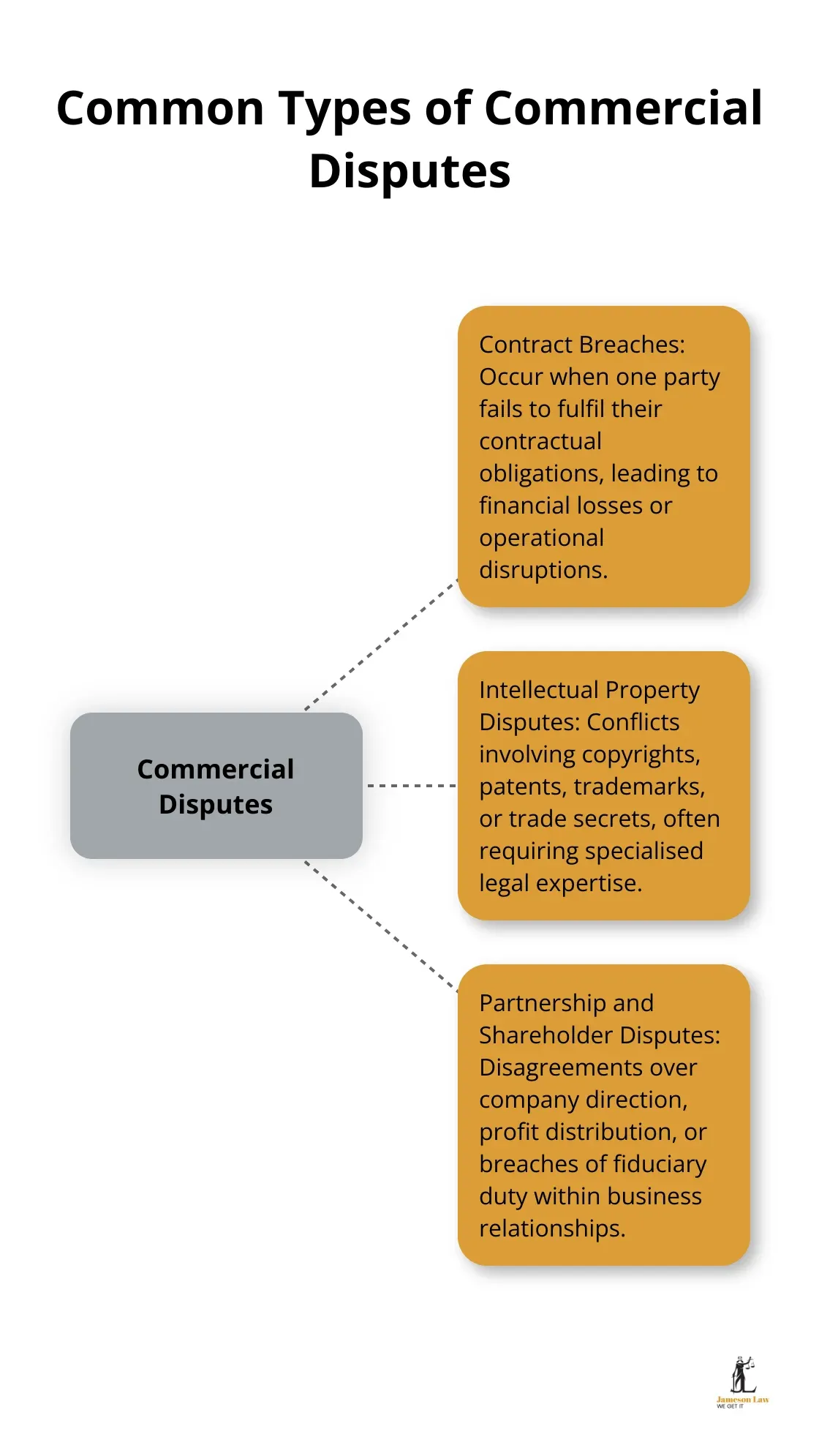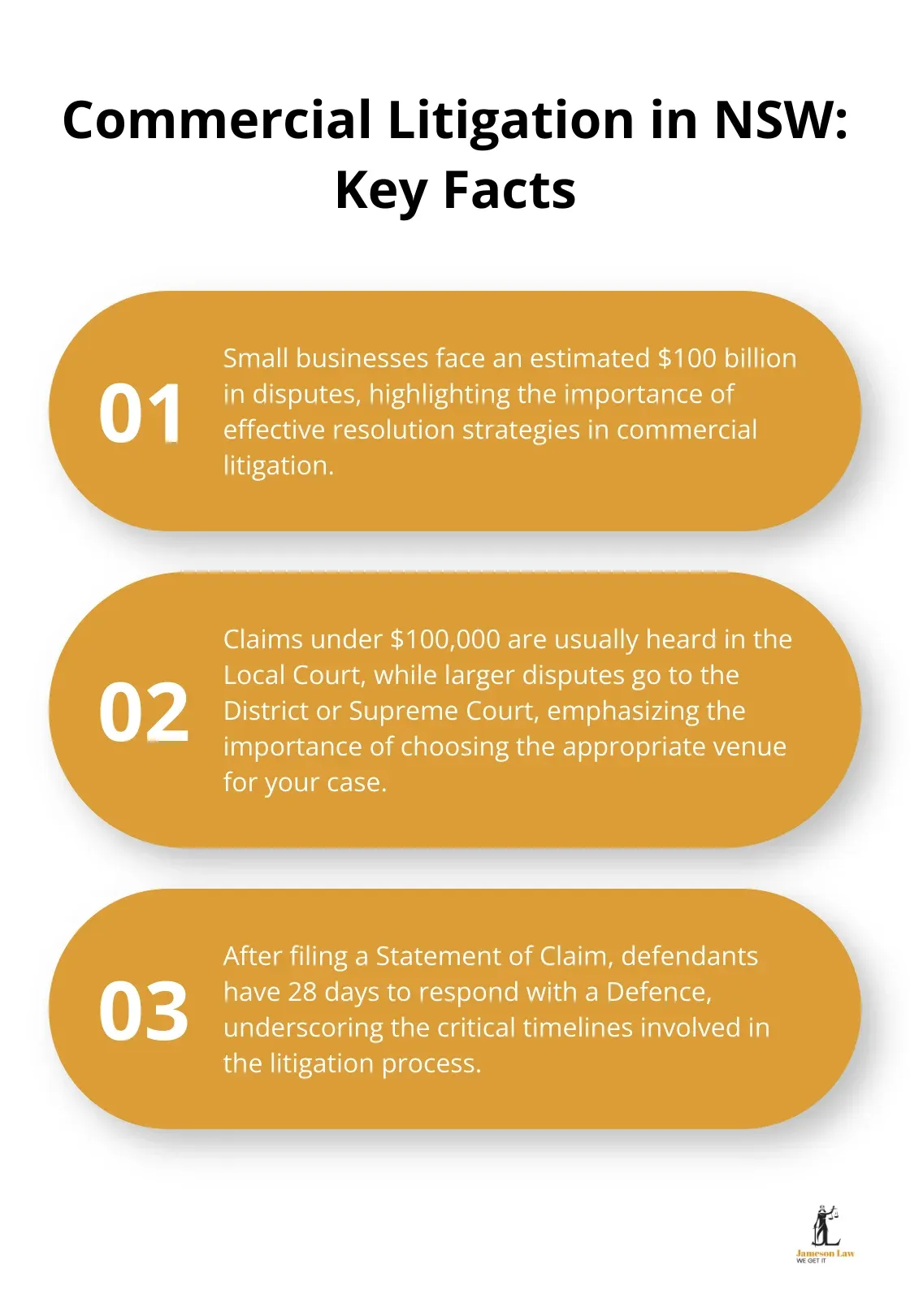Commercial litigation law can be a complex and challenging field to navigate. At Jameson Law, we understand the intricacies of business disputes and their potential impact on your company’s future.
Our blog post will guide you through the essentials of commercial litigation, from understanding its scope to exploring effective strategies for success. We’ll also shed light on the specific process in New South Wales, helping you prepare for what lies ahead in your legal journey.
What is Commercial Litigation?
Commercial litigation involves legal disputes arising from business relationships and transactions. It resolves conflicts between companies or between businesses and individuals when standard negotiations fail.
Types of Commercial Disputes
At Jameson Law, we handle a wide range of commercial disputes. Here are some common types:

Contract Breaches
These occur when one party fails to fulfil their contractual obligations. Such breaches can lead to financial losses or operational disruptions for the other party.
Intellectual Property Disputes
See IP Australia’s guidance on protecting and enforcing IP rights: IP enforcement in Australia.
Partnership and Shareholder Disputes
These often stem from disagreements over company direction, profit distribution, or breaches of fiduciary duty.
Commercial vs Civil Litigation
![]() Commercial litigation typically involves businesses and focuses on monetary damages or specific performance of contracts.
Commercial litigation typically involves businesses and focuses on monetary damages or specific performance of contracts.
![]() Civil litigation often involves individuals and covers a broader range of issues (e.g., personal injury claims or family law matters).
Civil litigation often involves individuals and covers a broader range of issues (e.g., personal injury claims or family law matters).
Commercial cases often require specialised knowledge of business law and industry-specific regulations. This highlights the importance of working with lawyers experienced in commercial litigation.
The Impact of Commercial Litigation
Commercial litigation can significantly affect businesses. It’s often time-consuming, expensive, and potentially damaging to a company’s reputation.
We at Jameson Law always advise our clients to consider alternative dispute resolution methods before proceeding to court. Mediation and arbitration can often lead to quicker, less costly resolutions while maintaining business relationships.
Understanding commercial law is the first step in effectively managing business disputes. Whether you face a contract disagreement or an intellectual property issue, a clear grasp of the litigation process can help you make informed decisions and protect your business interests.
Now that we’ve covered the basics of commercial litigation, let’s explore the specific process in New South Wales. This knowledge will help you prepare for what lies ahead in your legal journey.
How Does Commercial Litigation Work in NSW?
Pre-Litigation Steps
The commercial litigation process in New South Wales (NSW) follows a structured path from initial dispute to resolution. Before a case reaches court, several important steps occur.
A formal demand letter often starts the process. This document outlines the dispute, the desired outcome, and a deadline for response. It’s a powerful tool that often leads to early resolution.
If the demand letter doesn’t yield results, negotiations typically follow. These can be direct discussions between parties or facilitated by lawyers. Small businesses face an estimated $100 billion in disputes, highlighting the importance of effective resolution strategies.

Commencing Legal Action
When negotiations fail, the next step is filing a lawsuit. In NSW, this involves lodging a Statement of Claim with the appropriate court. The choice of court depends on the dispute’s value and complexity. For instance, claims under $100,000 are usually heard in the Local Court, while larger disputes go to the District or Supreme Court.
After filing, the defendant has 28 days to respond with a Defence. This timeline is critical – missing it can lead to a default judgement against the defendant.
The Discovery Phase
Discovery is a critical part of the litigation process. It involves exchanging relevant documents and information between parties. In NSW, discovery is governed by the Uniform Civil Procedure Rules 2005 (Part 21 – Discovery).
LawAccess NSW provides practical guidance for gathering documents and preparing a matter. During discovery, parties can request documents, conduct interviews (depositions) and inspect physical evidence. This phase can be time-consuming and costly, but it’s essential for building a strong case.
Trial and Judgment
If a settlement isn’t reached, the case proceeds to trial. In NSW commercial litigation, most trials are heard by a judge alone, without a jury. The trial process involves:
![]() Opening statements from both sides
Opening statements from both sides
![]() Presentation of evidence and witness testimonies
Presentation of evidence and witness testimonies
![]() Cross-examination of witnesses
Cross-examination of witnesses
![]() Closing arguments
Closing arguments
After the trial, the judge delivers a judgement. This can happen immediately or after a period of consideration. The judgement outlines the decision, reasons, and any damages or orders made. Settlement discussions can continue at any stage.
Winning Strategies for Commercial Litigation
Commercial litigation can be a complex and costly process, but with the right approach, businesses can navigate it successfully. We’ve seen firsthand how proper preparation and strategic decision-making can significantly impact the outcome of a case.
Select the Right Legal Team
Choosing the right legal representation is paramount. Look for lawyers with a proven track record in commercial litigation, specifically in your industry. Strong advocacy and clear communication make a measurable difference to outcomes.
Prepare Your Case Thoroughly
The importance of thorough case preparation cannot be overstated. Start by gathering all relevant documents (including contracts, emails, and financial records). Create a timeline of events and identify key witnesses. Your legal team should conduct a rigorous analysis of the strengths and weaknesses of your case.
Explore Alternative Dispute Resolution
While litigation is sometimes necessary, alternative dispute resolution (ADR) can often lead to quicker and less costly resolutions. See the Attorney-General’s Department overview of ADR options: ag.gov.au — ADR.

Manage Costs and Budget Effectively
Work with your legal team to scope the matter, stage work sensibly, and consider fixed-fee phases where appropriate. Budget for contingencies.
Stay Informed and Involved
Maintain regular communication with your lawyers, ask questions, and participate in key decisions. Informed clients help shape sound strategies.
Final Thoughts
Commercial litigation law presents complex challenges for businesses. It demands careful planning and strategic decision-making to protect company interests. Expert legal guidance can help navigate the intricacies of the legal process and develop robust strategies for dispute resolution.
We at Jameson Law specialise in commercial litigation law and provide tailored legal support to businesses facing disputes. Our experienced lawyers understand the nuances of commercial law and offer strategic advice to help clients overcome legal challenges. We focus on achieving optimal outcomes through negotiation, ADR, or court proceedings.
Early intervention often leads to more favourable outcomes in commercial disputes. Understanding the litigation process and implementing effective strategies can help businesses maintain their competitive edge in today’s challenging business environment. Contact Jameson Law for expert assistance in managing your commercial litigation needs.













